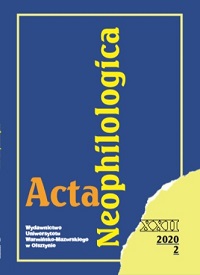Roussowska teoria woli powszechnej w publicystyce i myśli politycznej Gilberta Keitha Chestertona
Rousseau’s Doctrine of General Will in the Journalism and Political Thought of Gilbert Keith Chesterton
Author(s): Maciej SobiechSubject(s): Politics / Political Sciences, Politics, Political Theory, Political Sciences
Published by: Wydawnictwo Uniwersytetu Warmińsko-Mazurskiego w Olsztynie
Keywords: Gilbert Keith Chesterton; Jean-Jacques Rousseau; general will; anti-Semitism; democracy; journalism
Summary/Abstract: The aim of this paper is to demonstrate the role Rousseau’s doctrine of general will played in the thought and writings of Gilbert Keith Chesterton. The article begins with the characterization of the doctrine of general will as understood by Rousseau. Then, an overview of the existing critique of Chesterton’s heritage and what it had (or did not have to) to say about the matter in question is conducted. Next, the fact that Chesterton accepted the doctrine of general will is demonstrated by means of textual analysis. The paper ends with a section devoted to drawing some practical conclusions from the results of the analysis, with special stress laid on the fact that acknowledging the role the doctrine of general will played in Chesterton’s thought might not only serve as a “hermeneutical key” to the more controversial of his ideas (his democratism and his alleged anti-Semitism taken as examples), but also serve as the means to change the overall perception of him as a political thinker from a Catholic integrist to a Catholic pluralist.
Journal: Acta Neophilologica
- Issue Year: 2/2020
- Issue No: XXII
- Page Range: 137-150
- Page Count: 14
- Language: Polish

